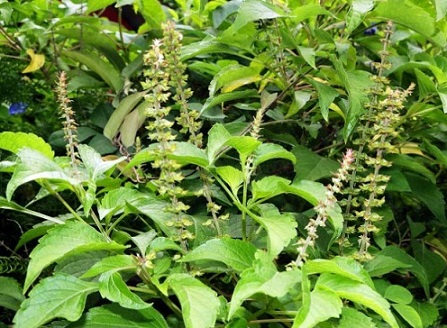Herbs And Phytochemicals - Ocimum gratissimum extracts show promise in the fight against lung cancer
Nikhil Prasad Fact checked by:Thailand Medical News Team Aug 20, 2024 1 year, 6 months, 3 days, 18 hours, 8 minutes ago
Herbs And Phytochemicals: Lung cancer remains one of the leading causes of cancer-related deaths worldwide, with current treatment options often being costly and accompanied by severe side effects. A recent study by researchers from Jackson State University-USA, Guangxi Normal University-China, Guangxi University-China, Johnson C. Smith University-USA, and Morgan State University-USA has shed light on a natural alternative that could revolutionize cancer treatment. This
Herbs And Phytochemicals news report delves into their groundbreaking findings, emphasizing the potential of fractionated leaf extracts of Ocimum gratissimum (Og), commonly known as Clove Basil, in inhibiting lung cancer cell proliferation and inducing apoptosis, offering a beacon of hope for millions affected by this devastating disease.
 Herbs And Phytochemicals - Ocimum gratissimum extracts show promise in the fight against lung cancer
Understanding the Significance of Ocimum gratissimum
Herbs And Phytochemicals - Ocimum gratissimum extracts show promise in the fight against lung cancer
Understanding the Significance of Ocimum gratissimum
Ocimum gratissimum, a basil species indigenous to West Africa, has long been recognized for its medicinal properties. Traditionally used to treat various ailments such as respiratory infections, epilepsy, and high fever, the plant's leaves have shown potential in modern medicine as well. Previous studies have highlighted the anti-cancer activity of its extracts against prostate cancer cells, but this study focuses on its effects on A549 lung adenocarcinoma cells.
The Study: Investigating the Anti-Cancer Potential of Ocimum gratissimum Extracts
The research team cultivated Ocimum gratissimum plants in the Jackson State University greenhouse, carefully preparing fractionated leaf extracts named P2 and PS/PT1. These extracts were tested for their anti-proliferative activity against A549 lung adenocarcinoma cells. The study found that both extracts inhibited cell proliferation in a concentration-dependent manner, with P2 showing the most significant effect at all tested concentrations.
The study findings highlight that, in addition to their anti-proliferative properties, the extracts also induced apoptosis, a form of programmed cell death, in the cancer cells. The researchers used 4′,6-diamidino-2-phenylindole (DAPI) staining to observe chromatin condensation and nuclear morphological changes, both key indicators of apoptosis. The results revealed a dramatic increase in apoptotic bodies, especially with higher concentrations of the P2 extract.
Delving Deeper: How Do the Extracts Induce Apoptosis?
Apoptosis is a crucial mechanism for eliminating cancer cells, and the study's findings are particularly promising. The extracts triggered both intrinsic and extrinsic apoptotic pathways, as evidenced by the upregulation of key pro-apoptotic proteins, including Caspase-8, BID, Cytochrome C, Caspase-9, and Caspase-3.
The intrinsic pathway, often referred to as the mitochondrial pathway, is activated by internal stress signals within the cell. In contrast, the extrinsic pathway is triggered by external sig
nals binding to death receptors on the cell surface. The study demonstrated a concentration-dependent increase in Caspase-8 expression in cells treated with the extracts, suggesting that both pathways were involved.
A particularly interesting aspect of the study is the role of BID, a pro-apoptotic protein that is cleaved by Caspase-8. The cleaved BID then translocates to the mitochondria, facilitating the release of Cytochrome C into the cytosol. This release triggers the formation of an apoptosome, leading to the activation of Caspase-9 and, subsequently, Caspase-3. The activation of Caspase-3 ultimately results in the cleavage of the actin cytoskeleton, causing the cell to collapse and die.
Implications and Future Directions
The study's findings underscore the potential of Ocimum gratissimum extracts as a natural, less toxic alternative to conventional lung cancer treatments. By inhibiting cell proliferation and inducing apoptosis through multiple pathways, these extracts offer a promising therapeutic approach that could be further developed and refined.
However, the researchers also emphasize the need for additional studies. While the results are promising, further studies are required to isolate, purify, and test the active compounds within the extracts. The potential for these compounds to be developed into effective, low-toxicity cancer treatments is immense, but this will require a concerted effort from the scientific community.
Conclusion
The present study concludes that fractionated leaf extracts of Ocimum gratissimum significantly inhibit the proliferation and induce programmed cell death in A549 lung adenocarcinoma cells in a concentration-dependent manner. This is the first time that the effects of fractionated Og extracts have been evaluated on A549 cells, providing new insights into the therapeutic potential of this plant. These findings lay the groundwork for future pharmacological studies aimed at harnessing the anti-cancer properties of Ocimum gratissimum, potentially leading to new, more effective treatments for lung cancer.
The study findings were published in the peer-reviewed journal: Nutrients.
https://www.mdpi.com/2072-6643/16/16/2737
For the latest on
Herbs and Phytochemicals, keep on logging to Thailand Medical News.
Read Also:
https://www.thailandmedical.news/news/how-certain-cytokines-might-affect-lung-cancer-risk
https://www.thailandmedical.news/news/unveiling-a-new-player-in-lung-cancer-the-c1orf131-gene
https://www.thailandmedical.news/news/texas-md-anderson-cancer-center-warns-that-covid-19-mrna-vaccines-elevate-pd-l1-levels-disrupting-lung-cancer-treatments-progressing-other-cancers
